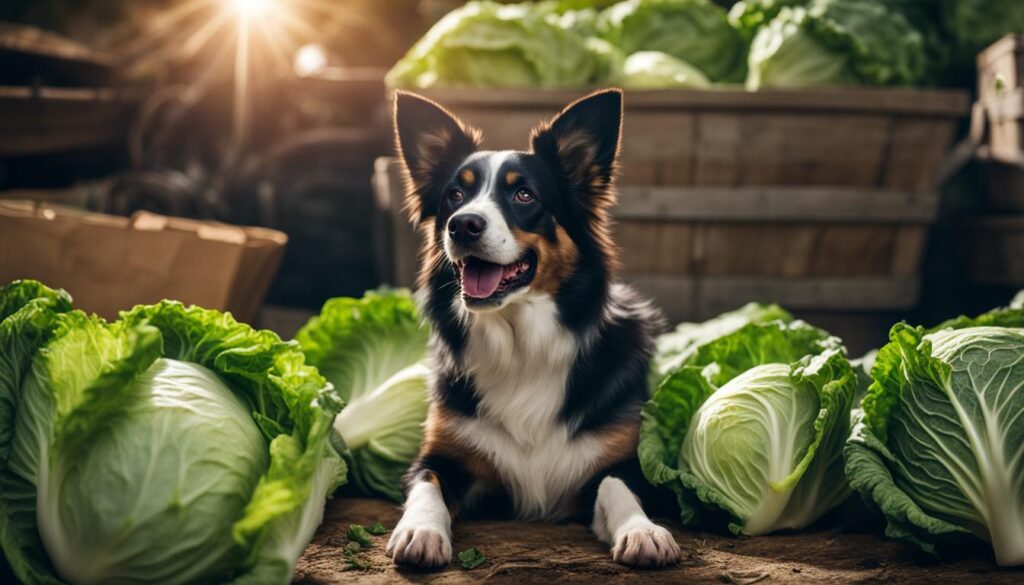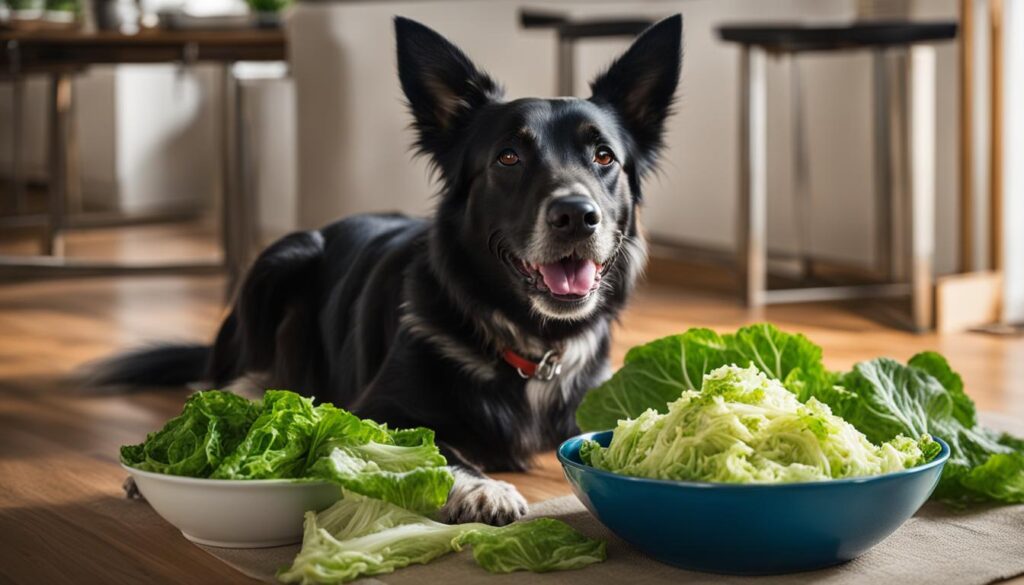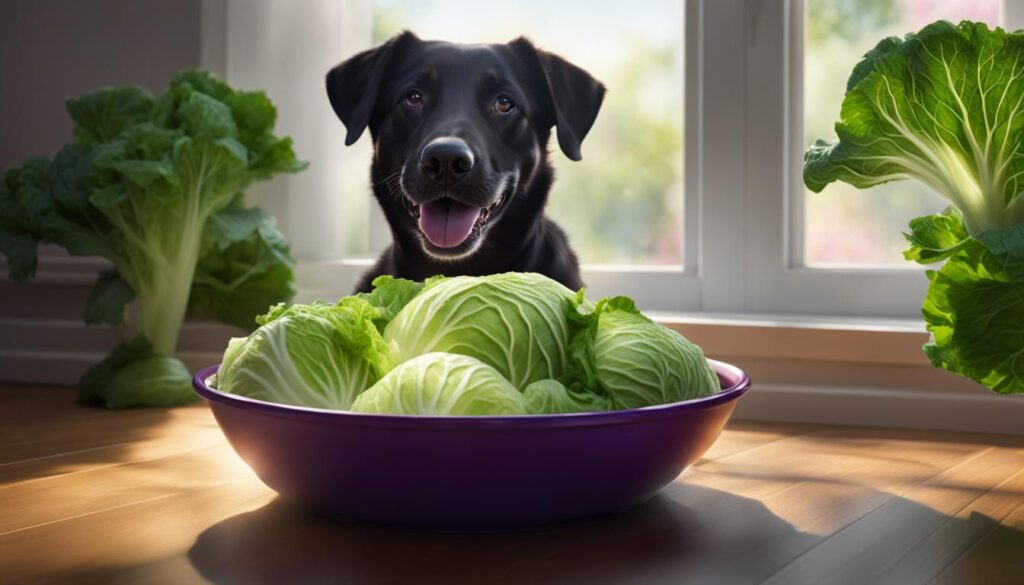As a dog owner, you may have wondered, “can dogs eat cabbage?” and “is cabbage safe for dogs?” These are legitimate concerns, considering the varying effects human food may have on our furry friends. With this in mind, this article is designed to provide you with insights into cabbage toxicity for dogs and help you understand whether or not you can safely share your favorite cruciferous vegetable with your beloved pet.
Key Takeaways
- Evaluating the safety of feeding cabbage to dogs
- Understanding the nutritional value of cabbage for dogs
- Antioxidants and health benefits of cabbage for canine companions
- Precautions and potential downsides to cabbage in a dog’s diet
- How to properly incorporate cabbage into your dog’s dietary plan
Understanding the Nutritional Value of Cabbage for Dogs
There are numerous benefits of cabbage for dogs that come from the key vitamins and minerals it contains. As a pet owner, it’s essential to understand the nutritional value of cabbage and its potential impact on your dog’s overall health.
Key Vitamins and Minerals in Cabbage
One of the primary appeals of a cabbage and dogs dietary combination is the abundance of vital nutrients. This cruciferous vegetable is a rich source of the following vitamins and minerals, all of which promote overall canine health:
- Vitamin A: vital for maintaining healthy skin, coat, and vision
- Vitamin C: essential for supporting a robust immune system
- Vitamin K: necessary for blood clotting and bone health
Additionally, cabbage contains notable amounts of calcium, potassium, and magnesium, which are crucial for strong bones, proper muscle functioning, and overall health, respectively.
Caloric Content: Is Cabbage a Good Fit for Your Dog’s Diet?
The caloric content of cabbage is relatively low, making it an excellent choice for pet owners looking to manage their dog’s weight or add some variety to their existing diet. One cup of chopped cabbage has only about 22 calories and nearly no fat, making it an ideal low-calorie treat.
However, when incorporating cabbage in your dog’s diet, be mindful of other high-calorie foods and treats your pup may be consuming to maintain a balanced intake.
Antioxidants and Other Health Benefits of Cabbage
Beyond the aforementioned vitamins and minerals, cabbage is also an excellent source of antioxidants, which play a crucial role in cabbage and dog health. Antioxidants help neutralize free radicals in the body, which can reduce inflammation and protect your canine companion from various diseases.
The health benefits of cabbage for dogs are not limited to its antioxidants. Cabbage also contains glucosinolates, which may have anti-cancer properties, and soluble fiber, which can support digestion and help manage weight.
In conclusion, understanding the nutritional value of cabbage for dogs, from its key vitamins and minerals to its caloric content and antioxidant properties, can positively impact your beloved pet’s overall health and well-being. Make informed decisions regarding your dog’s diet and witness the benefits of incorporating this nutrient-rich vegetable.
Cabbage and Dog Health: What You Should Know
As a dog owner, you might wonder if cabbage is a safe food to provide your pet. Understanding the effects of cabbage on your dog’s health is essential to ensure you make informed dietary decisions. This section will cover both the positive impacts of cabbage and precautions to consider when including it in your dog’s diet.


Can dogs have cabbage? The simple answer is, yes! While not every food appropriate for humans is suitable for your furry friends, cabbage is considered safe for dogs to consume in moderation. It provides various nutrients, including vitamins, minerals, and antioxidants that support your dog’s overall well-being.
Keep in mind that introducing any new food to your dog’s diet should be done gradually to avoid causing digestive upset.
However, you should be aware of some precautions when feeding cabbage to your dog:
- Digestive issues: Too much cabbage can lead to gastrointestinal distress or flatulence due to the presence of complex sugars and high fiber content. Start with small portions and gauge how your dog reacts, gradually increasing the amount if there are no adverse effects.
- Gases: Cabbage contains isothiocyanates, which can cause gas to build up in the digestive system of some dogs. If your dog is sensitive to these compounds, introduce cabbage gradually and monitor for signs of discomfort.
- Thyroid concerns: Cabbage is a cruciferous vegetable, and some sources claim that excessive consumption of cruciferous vegetables may lead to hypothyroidism in dogs. It is essential to maintain moderation and not rely on cabbage as a primary food source.
The table below provides an overview of the possible benefits and drawbacks of cabbage in your dog’s diet:
| Benefits | Drawbacks |
|---|---|
| Rich in vitamins and minerals | Potential digestive distress |
| Low-calorie food | Gas production in sensitive dogs |
| Antioxidant properties | Hypothyroidism risk with excessive consumption |
In conclusion, while cabbage is generally safe for dogs to consume, it is crucial to pay attention to your pet’s reactions and implement proper portions to avoid unnecessary discomfort. Understanding the effects of cabbage on dog health can help you make the best choices when designing your furry friend’s meal plan.
Incorporating Cabbage into Your Dog’s Diet
Once you decide to add cabbage to your dog’s diet, it is essential to know the best ways to serve it and determine the appropriate portion sizes. This section will discuss the advantages and drawbacks of raw and cooked cabbage for dogs and provide guidance on portion control for a balanced and healthy canine diet.


How to Serve: Raw vs. Cooked Cabbage for Dogs
There are two primary ways to serve cabbage to your dogs– raw and cooked. Both methods have their pros and cons, and either could be ideal depending on your dog’s preferences and dietary needs.
- Raw Cabbage for Dogs: Feeding raw cabbage ensures that your dog receives all of the available nutrients, as some can be lost during the cooking process. However, raw cabbage can be difficult for some dogs to digest, potentially leading to gas, bloating, and stomach discomfort. If you choose to offer raw cabbage, chop it finely and mix it sparingly with your dog’s usual food to help reduce potential digestive issues.
- Cooked Cabbage for Dogs: Cooked cabbage is generally easier for most dogs to digest, as the cooking process partially breaks down the fibrous content. Steaming or boiling cabbage without any added oils, seasonings, or butter is the healthiest option when cooking it for your pet. Overcooking can result in a loss of nutritional value, so be sure to cook it just enough to soften the cabbage without turning it into mush.
When introducing cabbage to your dog’s diet, it is best to start with cooked cabbage and gradually transition to raw if desired. This approach will help your dog’s digestive system adjust to the new food more easily while minimizing the risk of gastrointestinal upset.
Portion Control: How Much Cabbage Can Your Dog Have?
Proper portion control is crucial when incorporating cabbage into your dog’s meal plan. Cabbage should be considered a supplementary treat rather than a primary food source so that your pup continues to receive an appropriate balance of nutrients from their regular diet. To determine the right amount of cabbage for your dog, follow these general guidelines:
| Dog Weight | Serving Size |
|---|---|
| Up to 10 lbs | 1-2 teaspoons |
| 11-25 lbs | 1-2 tablespoons |
| 26-50 lbs | 2-4 tablespoons |
| 51-75 lbs | 4-6 tablespoons |
| 76 lbs and above | 6-8 tablespoons |
Bear in mind that individual dogs may have specific dietary requirements and portion sizes should be adjusted accordingly. Consult your veterinarian to establish the most suitable amount of cabbage for your pet, particularly if they have pre-existing health conditions or special nutritional needs.
Conclusion
In summary, the question of can dogs eat cabbage has been thoroughly examined, providing valuable insights for pet owners. Yes, dogs can eat cabbage, but it’s essential to consider moderation and proper preparation when incorporating this vegetable into their diets. By doing so, you can ensure that your furry friend experiences the numerous health benefits associated with cabbage, while minimizing potential risks.
The advantages of cabbage and dog health become apparent when recognizing the nutritional benefits it offers, including vital vitamins, minerals, and antioxidants. However, it is crucial to follow best practices when introducing cabbage to a dog’s diet, such as choosing between raw or cooked servings, and adhering to appropriate portion sizes based on your dog’s individual needs.
Ultimately, the decision to incorporate cabbage into your dog’s diet lies with you, the pet owner. By understanding the benefits, risks, and proper feeding guidelines, you can make well-informed choices to support your dog’s overall health and well-being.
FAQ
Can dogs safely eat cabbage?
Yes, dogs can safely eat cabbage in moderation. It is important to ensure that the cabbage is prepared correctly and served in appropriate portion sizes.
What are the benefits of cabbage for dogs?
Cabbage is a low-calorie vegetable that is an excellent source of vitamins, minerals, and antioxidants. It can support a dog’s overall well-being and help protect them from certain diseases.
Can cabbage be toxic for dogs?
Cabbage itself is not toxic to dogs. However, excessive consumption may cause digestive discomfort and gas. It is essential to serve cabbage in moderation and with the appropriate preparation to avoid any negative effects on your dog’s health.
Is it better to serve raw or cooked cabbage to dogs?
Cooked cabbage is generally preferred over raw cabbage for dogs. Cooking cabbage can help soften the fibers, making it easier for dogs to digest. However, it is essential to avoid using any harmful additives such as salt or spices, which can upset a dog’s stomach.
How much cabbage can my dog safely eat?
The appropriate serving size of cabbage for your dog will depend on their size and dietary needs. Generally, a small amount of cabbage can be safely incorporated into a dog’s regular diet as an occasional treat. It is advisable to consult your veterinarian for personalized guidance on portion sizes for your dog.
Are there any precautions to consider when feeding cabbage to dogs?
Make sure to consider your dog’s size, dietary needs, and potential food allergies when introducing cabbage into their diet. Introduce cabbage gradually and monitor your dog for any signs of digestive discomfort or an allergic reaction. Always consult your veterinarian if you have concerns about your dog’s diet or health.

